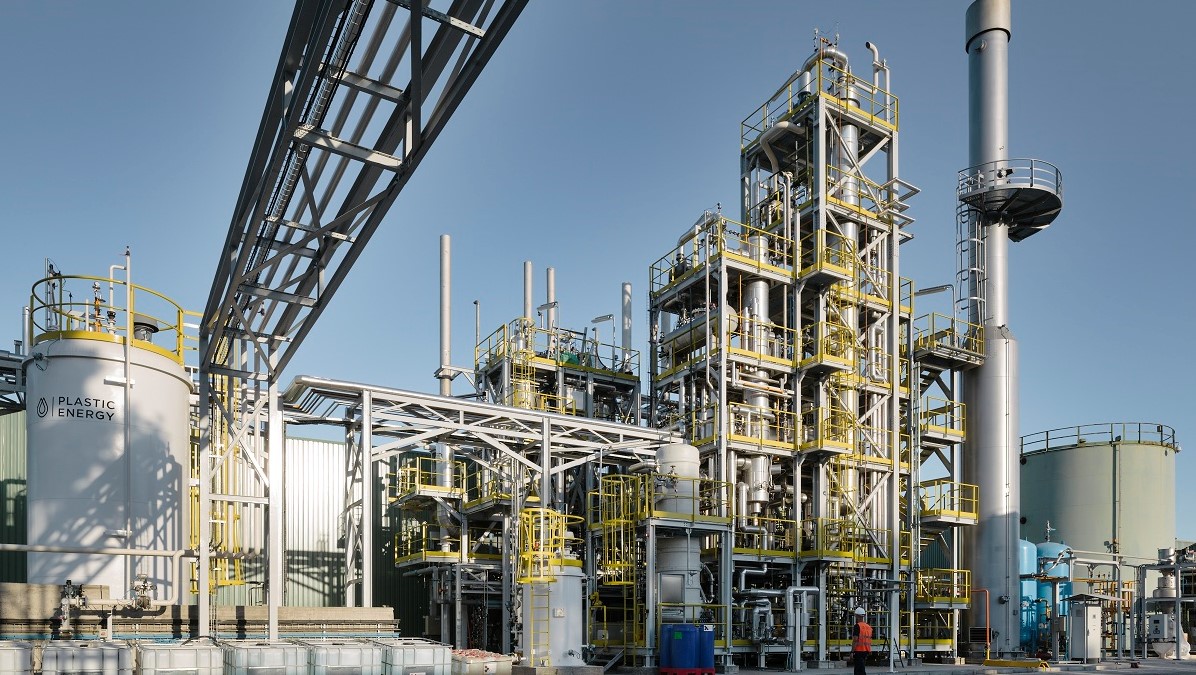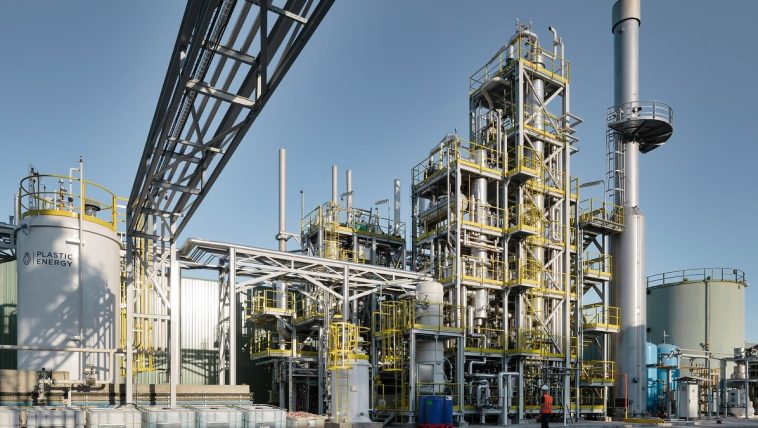
Advancing Chemical Recycling: A Promising Breakthrough in Waste Management
The recent milestone reached by Recon Technology Ltd. has sparked discussions about the future of waste plastic management and chemical recycling. As the construction of the main manufacturing plant for Shandong Recon Renewable Resources Technology Co., Ltd.’s 40,000-ton-per-year waste plastic project tops out, industry experts and environmental advocates alike are taking a closer look at what this development means for sustainable resource utilization and economic growth. In this opinion editorial, we explore the evolving landscape of chemical recycling—not just as a business endeavor, but also as a vital component of the global push toward a circular economy.
Recon, a prominent China-based provider specializing in oilfield and low-carbon energy services, has invested over $15 million in this project. With the project poised to begin trial operations in December 2025, numerous questions and opportunities arise regarding its long-term impact, both environmentally and economically. This analysis will dissect the twists and turns of the project’s development, the advanced technologies driving the process, and the potential ripple effects across global markets.
Technological Innovations Powering the Recon Project
A key question on many minds is how Recon’s new project addresses the tricky parts of plastic recycling. Traditional processes have often been limited by issues such as plastic coking and inconsistent feedstock supply. Recon’s approach, blending catalytic pyrolysis with catalytic reforming techniques, appears to transform these complicated pieces into a model that could serve as a global benchmark.
Exploring Advanced Catalytic Pyrolysis Techniques
One of the standout features of this initiative is the employment of a “horizontal screw-type three-stage continuous reactor” within the pyrolysis process. While earlier methods struggled with frequent coking—where plastics accumulate residual carbon—this innovative reactor design overcomes many of these confusing bits of technology. In essence, it ensures:
- Stable and continuous feedstock supply
- Efficient breakdown of plastic waste
- Reduced downtime due to operational challenges
The reactor’s ability to continuously process waste without the typical hindrances has made it a game-changer. This breakthrough is particularly important because it allows for the consistent production of high-value pyrolysis oil—a commodity that will serve as a sustainable chemical feedstock not only for domestic markets but also for international consumers.
The Role of Catalytic Reforming in Enhancing Product Quality
Complementing the catalytic pyrolysis process, the introduction of catalytic reforming plays a super important role in reshaping the outcome of the entire operation. This secondary process focuses on increasing the olefin content of the pyrolysis oil, thereby significantly enhancing its market competitiveness. Without this crucial step, the resulting product might struggle to meet the quality standards demanded by large-scale chemical plants and consumer product manufacturers.
Technologists and industry experts see the integration of these methods as the solving of many previously nerve-racking issues. For example, by boosting the olefin content, recon’s product becomes a preferred option when compared to similar offerings that lack such refinement. The multiple stages involved in the process not only maximize the yield but also uplift the overall energy efficiency of the plant. Such advancements are set to serve as the foundation for what could become a series of best-practice models within the chemical recycling arena.
Economic Implications and Market Opportunities
The financial forecast for the Recon Plastic Chemical Recycling Project is promising. With an expected annual production of 30,000 tons of plastic pyrolysis oil and 6,000 tons of carbon residue, the project is estimated to generate revenues of about $30 million each year. This result is not merely a multiple of dollars earned; it is also a validation of chemically recycling waste plastics as a secure investment avenue in the modern sustainable economy.
Project Economics: Breaking Down the Numbers
One can break down the economic benefits of the project into several key categories:
- Revenue Generation: The high-value conversion of waste plastic into chemical feedstock and other by-products is anticipated to bring in substantial annual earnings. With a projected $30 million in annual returns, the project underscores its importance as a profit center for Recon.
- Job Creation: The plant, spread over 50 acres, will likely create numerous job opportunities, ranging from technical roles in process engineering to managerial positions in production and logistics.
- Local Economic Stimulus: The regional economy stands to benefit from the influx of investments and the enhancement of infrastructure, making the Shandong area an emerging hub for high-tech recycling initiatives.
These financial aspects are a testament to the potential that chemical recycling holds, both as an innovative business model and as a mechanism to foster economic growth. The project serves as an example of how technology-driven initiatives can generate impressive returns, even when navigating the tricky parts of waste management and sustainable development.
Building Strategic Partnerships for Growth
Another layer of the project’s economic narrative is the formation of strategic partnerships. Recon is actively engaging in discussions with multinational chemical giants and leading domestic chemical companies, while product purchase intent and strategic cooperation agreements are already in place. These collaborations are not only crucial from a supply chain perspective but are also instrumental in setting standards for the industry.
Such partnerships typically involve:
- Shared Investment: Pooling resources to fund further research and development.
- Technology Transfer: Exchanging knowledge that enhances process efficiencies and product qualities.
- Market Expansion: Opening avenues for selling high-quality pyrolysis oil in both domestic and international markets.
Strategic partners can help stabilize the commercial viability of the project, ensuring that once the plant is fully operational, it benefits from an extensive and well-managed value chain. These alliances exemplify how modern chemical recycling initiatives can look beyond local markets, aspiring for global influence and broader applicability.
Sustainable Waste Management: Tackling Tangled Issues
While creating an effective business model for chemical recycling is a significant achievement in itself, environmental sustainability is the other side of the coin that cannot be overlooked. Recon’s project is emblematic of a larger movement, one that seeks to address the overwhelming challenge of waste plastic accumulation using smart, resource-efficient technologies.
Converting Waste into Value: Addressing Global Plastic Pollution
Today, many countries are wrestling with waste management strategies that struggle to keep pace with increasing pollution. One of the more problematic varieties of plastic—membrane film-type waste plastics—poses a particular challenge for conventional physical recycling methods. By converting such problematic waste into high-quality pyrolysis oil, Recon’s facility effectively finds its way around longstanding issues.
This technological intervention offers several benefits:
- Reduced Landfill Dependency: By reprocessing waste into feedstock, there is less need to fill landfills with non-degradable material.
- Lower Environmental Impact: The approach decreases the volume of waste that can contribute to environmental degradation or “white pollution.”
- Circular Economy Benefits: The process contributes to a self-sustaining recycling loop where waste is continuously reintegrated into the industrial cycle.
Moreover, the attempt to meet international certifications like ISCC (International Sustainability and Carbon Certification) signifies a commitment to global standards. In doing so, the project not only adheres to domestic laws and regulations but also positions itself as a model for international best practices in waste plastic chemical recycling.
Environmental Impact and Policy Considerations
From an environmental perspective, the adoption of full-process digital management to build a low-carbon smart factory is one of Recon’s most striking commitments. It addresses many of the little details that can otherwise be riddled with tension in large-scale industrial operations.
Key environmental advantages of this strategy include:
- Enhanced Energy Efficiency: Digital management tools allow for real-time monitoring, ensuring that the plant operates at peak efficiency.
- Lower Carbon Footprint: With automated systems reducing waste and optimizing production cycles, overall greenhouse gas emissions can be kept in check.
- Improved Safety Compliance: Digital oversight simplifies adherence to strict safety and environmental standards, reducing the likelihood of environmental mishaps.
As policymakers and regulators continue to push for greener industrial practices, Recon’s project not only conforms to these challenging mandates but also sets the stage for future legislative frameworks. By turning waste into a resource and establishing eco-friendly operational protocols, such projects can serve as a focal point for policy debates on sustainable manufacturing practices.
Manufacturing Scale and the Future of Low-Carbon Smart Factories
At the heart of Recon’s project is an unmistakable focus on building a smart, low-carbon factory. The significance of this initiative reaches far beyond the confines of a single manufacturing plant. It is a forward-thinking model that may very well shape the future in the following ways:
Embracing Digital Management Systems
The plant’s full-process digital management system is one of the most compelling aspects of the project from a technological standpoint. This system not only optimizes operational efficiency but also builds resilience into the manufacturing process. Digital oversight allows personal oversight in real time, helping operators to address unexpected twists and turns during production. This means small glitches can be caught and corrected before they escalate into larger, more intimidating problems.
Some of the super important benefits include:
- Real-Time Monitoring: Digital dashboards provide live data, helping operators get into subtle parts of the process that, when optimized, can boost overall production efficiency.
- Predictive Maintenance: With a digital system in place, potential issues can be spotted early, preventing downtime and ensuring smooth commissioning.
- Data-Driven Decisions: Analytics and data collection foster greater transparency, enabling continuous improvement in operational parameters.
All these layers of improvement add up to a state-of-the-art facility that could serve as a benchmark for similar projects on a global scale. The push toward digital solutions is more than just a technological upgrade; it is an essential shift in how modern industrial plants can combine operational efficiency with environmental responsibility.
Scalability and Replication Across Global Markets
Beyond the immediate economic and environmental advantages, there lies the broader question of scalability. Recon’s plant, with its sophisticated design and digital framework, lays the groundwork for a model that can be replicated across different regions. In countries grappling with significant plastic waste challenges, establishing similar smart factories could mitigate the ever-growing worry of waste accumulation while simultaneously boosting local economies.
There are a few critical elements to ensuring successful replication:
- Standardization of Technology: Developing a set of “best practice” guidelines based on successful outcomes ensures that future plants can be set up with minimal complications.
- Local Adaptation: While the core technology remains consistent, adaptations might be necessary to tackle specific local waste management issues.
- Investment in Training: Establishing dedicated training programs to help local talent adapt to digital management and advanced recycling technologies is essential.
As industrial players and governments consider expanding such initiatives, the experience gained from the Shandong project stands out as a beacon. The lessons learned here—from addressing nerve-racking technical issues to managing the delicate interactions of digital systems and chemical processes—will be intrinsically valuable for similar efforts worldwide.
Strategic Considerations and Industry Collaborations in a Global Context
Recon’s recent milestone has added another chapter to the journey of integrating advanced chemical recycling into global industrial practices. In discussions with both multinational chemical giants and domestic industry leaders, the project underscores the importance of strategic collaboration. These partnerships not only validate the technology but are also instrumental in fostering market confidence.
Forging Partnerships: Benefits and Opportunities
Strategic alliances can be particularly beneficial, as evidenced by Recon’s engagements. Here are some key benefits drawn from recent collaborations:
| Benefit | Description |
|---|---|
| Market Access | Partnerships provide direct access to established supply chains and customer bases in both domestic and international markets. |
| Technology Sharing | Cooperative agreements foster the exchange of knowledge, helping all parties better manage the tricky parts of advanced recycling technology. |
| Risk Reduction | Shared investments and risk pooling make projects less intimidating, easing the nerve-racking uncertainties that come with innovative industrial practices. |
| Regulatory Alignment | Collaborative endeavors ensure regulatory compliance, streamlining certification processes such as ISCC, which is essential for global acceptance. |
These strategic moves not only enhance the project’s viability but also signal to the broader market that there is a robust, multi-faceted support system backing this technology. In many respects, the initiative is a proof point for the future of sustainable chemical recycling globally. By integrating local expertise with international best practices, we are witnessing the emergence of an industry that is capable of turning environmental challenges into economic opportunities.
Global Policy Implications and the Path Forward
Looking at the broader picture, the success of projects such as Recon’s will have significant implications for global environmental policies. As countries remain on edge about how to manage ever-increasing plastic waste, pioneering projects help shape regulations and standards worldwide. Policymakers may find inspiration in the digital integration and low-carbon approaches being adopted here, pushing for similar systems to be embedded into future environmental legislation.
Key policy aspects that benefit from such innovation include:
- Standardization of Recycling Protocols: With proven technology, governments can confidently promote similar models, reducing fragmented regulatory practices.
- Encouraging Public-Private Partnerships: Successful private projects pave the way for synergistic collaborations with public institutions that can drive more widespread adoption of advanced recycling practices.
- Incentivizing Green Investments: Demonstrable returns on investments in chemical recycling can lead to policy incentives, including tax breaks and subsidies, for similar sustainable initiatives.
In this evolving landscape, the collaboration between technology, policy, and economics paves a promising path forward. Working through the complicated pieces of designing and operating a modern chemical recycling plant, Recon is setting a benchmark not only in production but also in environmental accountability.
Overcoming Operational Challenges: The Human Element and Technological Synergy
Large-scale projects such as this are not immune to nerve-racking challenges. The establishment of a facility which converts waste plastic into high-quality pyrolysis oil involves intricate coordination across different sectors. From technical engineers to digital system operators, every stakeholder plays a crucial role in ensuring that the plant operates smoothly and meets its production targets. In essence, at the intersection of human expertise and robotic precision lies the secret to overcoming the tangled issues that often arise in production phases.
Human Expertise and Its Role in Operational Excellence
The success of any technological innovation hinges on the team behind it. Recon’s CEO, Mr. Yin Shenping, emphasizes that the project’s achievements are rooted in the team’s ability to tackle fine points and subtle parts of the process—be it passing rigorous industrialization experiments or meeting strict domestic safety standards. His comments indicate that while technology is a super important factor, equally critical is the human drive to innovate and manage challenging ongoing operations.
Consider the following aspects that highlight the human element:
- Rigorous Training Programs: Operators receive continuous training to make their way through both planned and unexpected production challenges.
- Collaboration Across Departments: Effective communication between engineers, production managers, and the digital monitoring team ensures that seemingly minor issues are caught early.
- Commitment to Safety: The company’s emphasis on safety and reliability verification builds trust with regulatory bodies and investors alike.
This synergy between human expertise and innovative technology is likely to become a defining factor in transforming other nerve-racking industrial projects into globally competitive endeavors.
Implementing Best Practices for Reliable Commissioning and Production
The coming months, leading up to the plant’s full operations, will be critical. Recon’s strategy involves a one-month trial operation phase starting in December 2025. This period will help iron out any remaining twists and turns before the facility moves into full, stable production.
The rollout strategy includes:
- Systematic Testing: Multiple phases of testing ensure that both hardware and software components interact seamlessly.
- Data Review and Analytics: Digital management systems will continuously collect data that can be analyzed to pinpoint areas needing improvement.
- Feedback Loops: Immediate corrective measures will be put in place when small distinctions or unexpected issues emerge during trial operations.
This rigorous approach contributes to a robust commissioning process, ensuring that the plant does not only meet internal benchmarks but also stands as a reliable reference for future projects across the sector.
Implications for the Future of Plastic Upcycling and Chemical Recycling
The Recon project signals an important transformation in the chemical recycling industry. As the project nears its production launch, many industry observers believe that such initiatives will drive the future forward through innovations that repurpose waste effectively and energize global markets.
Expanding the Portfolio of Recycled Products
Currently, Recon’s project focuses on converting membrane film-type waste plastic—challenging to process using traditional physical recycling—into high-quality pyrolysis oil and carbon residue. However, as technology evolves, there is strong potential for further expansion into:
- New Chemical Intermediates: Research and development may yield additional high-value by-products that can serve various industrial applications.
- Specialty Plastics: Developed processes might soon allow for the conversion of even more exotic types of plastics, broadening the scope of materials capable of being recycled.
- Energy Recovery Products: Innovations could make it possible to integrate energy recovery more directly into the recycling process, providing an alternative energy source for production facilities.
Such developments would contribute significantly to the global effort to reduce waste, presenting both economic opportunities and environmental benefits. By tapping into a broader palette of materials and methods, the chemical recycling industry can help steer through numerous environmental challenges that have long been considered off-putting by traditionalists.
Adapting to Global Market Trends and Consumer Demand
Economic dynamics are ever-changing, and so is the global appetite for more sustainable industrial products. With increasing awareness about environmental sustainability, consumers, and major chemical companies alike are looking for reliable sources of recycled materials. Projects like Recon’s offer a glimpse into a future where:
- Products are integrated into existing supply chains: Recycled chemicals can seamlessly replace virgin inputs in numerous applications, from consumer goods to industrial manufacturing.
- Environmental credentials drive purchasing decisions: Companies are keen on aligning with suppliers who can clearly demonstrate adherence to international sustainability certifications like ISCC.
- Innovation fosters competitive pricing: With technological efficiencies, the cost of recycled products may eventually be competitive with, or even lower than, traditional raw materials.
Such trends bode well for the chemical recycling industry, promising an era where sustainable practices are not only environmentally crucial but also economically appealing.
Charting the Path Forward: Integrating Economics with Sustainability
Recon’s project provides a robust case study in the successful melding of economic strategies with green technology. The plant is set to address not only the immediate need for efficient waste management but also the enduring economic challenges of scaling a profitable, eco-friendly business model. By converting problematic waste streams into viable revenue streams, initiatives like this remind us that even the most tangled issues can be turned into lucrative opportunities.
The Economic Rationale Behind Sustainable Recycling
A clear economic rationale drives this project. By addressing the small distinctions in process efficiencies and product quality, Recon is laying down an economic foundation that stands as a counterpoint to traditional waste management practices. The value proposition here is multifold:
- Enhanced Profit Margins: Converting waste into high-quality chemical feedstock with significant market demand ensures a steady revenue flow.
- Cost Efficiency: Through digital management and predictive maintenance, operational costs are expected to remain competitive against conventional recycling methods.
- Risk Mitigation: Strategic partnerships and robust testing during trial operations help reduce the unpredictability of large-scale industrial projects.
These advantages illustrate how sustainable recycling is not only an environmental imperative but also an economically sound strategy. The project’s success could serve as a template for future investments into similar areas, enticing both seasoned investors and emerging market players.
Long-Term Impact on the Circular Economy
Looking at the broader implications, the integration of chemical recycling within the circular economy framework represents a critical step towards sustainable industrial growth. By transforming low-value, waste materials into high-value chemical products, projects like Recon’s demonstrate a scalable solution that could eventually reduce reliance on traditional fossil-based resources. The idea of keeping materials in continuous use is not new, but the ability to do so effectively and profitably in the chemical sector represents a significant leap forward.
This initiative may influence various sectors:
- Automotive and Manufacturing: Enhanced recycled products can be used as key inputs in several industries, reducing environmental burdens while supporting advanced manufacturing processes.
- Energy Sector: Low-carbon smart factories, built around digital management systems, can serve as reference models for other energy-efficient projects.
- Public Policy: Demonstrated success may push governments to adopt more progressive mandates, spurring further investments in sustainable technologies.
Ultimately, the project reinforces the idea that reconciling economic goals with sustainability targets is not only possible, but also profitable—a paradigm that could shape future policy and industry standards across the board.
Conclusion: Setting a New Benchmark for Global Chemical Recycling
In summary, Recon Technology Ltd.’s milestone in completing the main structure of their 40,000-ton-per-year waste plastic chemical recycling plant marks a turning point in the battle against waste plastic and the pursuit of sustainable industrial practices. Beyond the impressive $15 million investment and state-of-the-art catalytic processes, the project serves as a case study in transforming challenging waste management issues into profitable and eco-friendly solutions.
In addressing the confusing bits of traditional plastic recycling, the innovative combination of catalytic pyrolysis and reforming stands as a testament to the potential for positive change. With its digital management system and a commitment to low-carbon operations, this plant is well-positioned to become a global benchmark for similar endeavors. As the project progresses into its trial and production phases, all eyes will be on how quickly and effectively it translates technical successes into tangible economic and environmental benefits.
From forging strategic partnerships and navigating regulatory landscapes to addressing the intricate human elements that drive operational excellence, every facet of the project illustrates how modern chemical recycling can chart a new course for a sustainable future. In a world on edge about environmental degradation and resource depletion, initiatives like these demonstrate that the path forward lies in turning what many consider waste into a valuable commodity.
Recon’s ambition to revolutionize waste plastic utilisation not only responds to the pressing environmental issues of our times but also sets a clear example for other industries to follow. As they work your way through the final stages of commissioning and fine-tune their production processes, the expectations for a significant return on investment—both financial and societal—continue to mount. The project stands as a call to action for industry leaders, policymakers, and environmental advocates alike: it is time to embrace innovative, sustainable methods that address our planet’s waste challenges head-on.
While there remain some nerve-racking challenges ahead—especially in ensuring stable production and managing the operational twists and turns—the overall outlook appears positive. As we take a closer look at projects like this, it becomes evident that sustainable business practices can indeed produce profitable outcomes when backed by robust technology and thoughtful strategy.
Looking forward, the global chemical recycling sector is poised to witness rapid growth, with Recon’s project leading the way. As more companies and governments invest in similar initiatives, the combined impact on reducing plastic waste could be substantial. This is not merely an isolated investment; rather, it is a paradigm shift that holds promise for a cleaner, more sustainable industrial future.
In closing, Recon Technology Ltd. has set the stage for what could become a benchmark initiative, illuminating the path for future projects designed to transform waste into wealth. By addressing the nerve-racking and tangled issues that have long plagued plastic recycling, the company is redefining the possibilities of economic development aligned with environmental responsibility—a move that will undoubtedly resonate on a global scale.
Originally Post From https://technode.global/prnasia/recon-hits-milestone-chemical-recycling-plant-construction-finished-as-project-nears-production-launch/
Read more about this topic at
Recon Hits Milestone: Chemical Recycling Plant …
delivery of large tanks for chemical recycling plant


